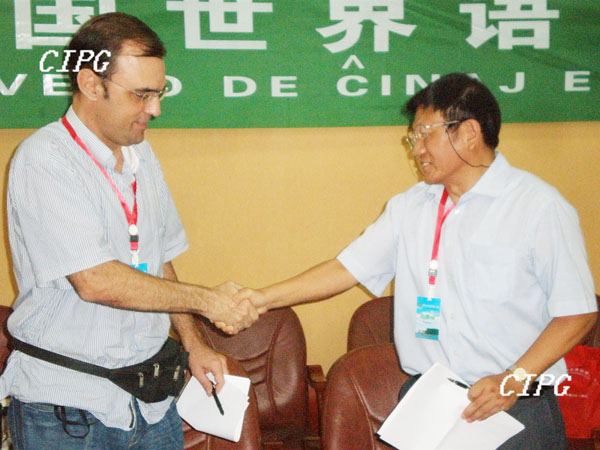Poor countries should not have to make bad international business deals because of weak language skills. Sinjoro Eng explains the importance of Esperanto in international trade.
John wanted to find a Mandarin language teacher because he wanted to export his product to China. He asked me to get him the quickest way to master the language, perhaps, in 50 hours.
“A Chinese needs about 12 years to master the language, and you want to learn Mandarin in less than 100 hours.” I tried to comprehend how John got his information in language learning.
“I saw an advertisement,” he told me and dug into his briefcase and showed me the leaflet.
Can that be possible?
Yes, if you learn Esperanto, within 100 hours you can converse well with your business partner in China, not only in China, it is in the world.
Many people do not have the information about the changing world. The rise of China got many people into panic and rushed for Mandarin courses. You can read about it in letters to editors or even forum posts.
The Look East Policy got many running for Japanese courses. Look at it now!
The rise of China does not compel the world to learn Mandarin. It is the kiasu type of people would have got themselves pressured and later started to blame China.
The setting up of Kong Zi Xue Yuan (Confucian Schools, which is responsible for disseminating information of the Chinese culture and language) does not reflect the soft conquering of China. China in the past and in the future will not colonise the people in the world. The leaders of China repeatedly assured us of this.
Mandarin is not easy to learn. It needs about 4,000 hours to master the language. This would probably take about one quarter of a person’s life if you are not born a Chinese.
Many Malaysians, of course in South East Asia too, do not know about the Esperanto Commerce Group. The Chinese Esperanto merchant group, formed under the suggestion of Chairman Hu Jin Tao and is now into its fifth year in 2011.

Reading up to this point, you may say that 5 years makes it a very new initiative. Yes, but do not forget the hard times China had in the past, and the cultural revolution slowed down the pace of using Esperanto. Let me reproduce an article which appeared in 1921 in New York Times.
Paris business men would use Esperanto
Chamber of Commerce Committee finds it useful as a code in international trade
Paris, Feb, 15– The Paris Chamber of Commerce has taken the initiative in instituting Esperanto classes in all their commercial schools so that students can learn for commercial purposes an auxiliary international language. Before taking this step the chamber appointed a committee to to inquire into the real usefulness of Esperanto, and among other tests they made was to translate a large number of business letters into Esperanto and back into French. It was found that the sense of the letter was no way lost.
The committee recommended that Chambers of Commerce in other countries should be asked to institute similar classes in the language invented by Dr Zamenhof, which they are convinced will enable international business to be carried on without error and with much greater dispatch and cheapness than when translators into half a dozen languages have to be employed. The ease with which Esperanto can be learned and its accuracy in translation were regarded as its two principal recommendations above other artificial languages. For business purposes, it is regarded by far the clearest and richest in expression and easy to translate.
Some of the texts submitted to the test were such that the slightest mistake would completely change the meaning, but Esperanto was found to meet all the requirements. M. Andre Baudet, Chairman of the committee on whose recommendation it was decided to open the classes, describes Esperanto as rather an international code than as a language.
‘It won’t revolutionize the world,’ he said, ‘and there is no likelihood that it will take the place of any language, but, just like a telegraphic code or a system of stenography, it can be useful to every people and aid enormously in international business.’
The New York Times, Published: February 16, 1921
If this is not able to let you foresee the change in future, the British TV commercial advertisement would certainly wake you up that Esperanto is a part of promoting your products, especially the export business.
If you know BTG in Britain, this advertisement would be able to tell you how Esperanto is moving towards an important role, among so many languages, Esperanto was chosen to appear in the advertisement. Think twice!
[Embed video: http://www.youtube.com/watch?v=ZcotIKtONCA&feature=related ]
La Internacia Komerca Ligo (The International Esperanto Commerce League) existed two decades ago, but few Malaysian businesspersons (as not to fall into the gender issue argument, leave out the men and replace with the persons, however, I would have no such problem in using Esperanto, it is gekomercantoj, no discrimination of gender in Esperanto) know about Esperanto, and the potential to tap into the Esperanto business sector like China.
Each year, the China Esperanto Commerce Group would hold an annual meeting and certainly would not leave the business contracts out for arranging the exhibition. The 2010 World Expo in Shanghai saw them train many Esperanto ushers. Though Malaysia would not be able to host this world event soon, if they would, they would certainly exclude the Esperanto speakers.

If the tourism board is sensitive enough, they should have produced the pamphlets in Esperanto or even screened the Esperanto advertisement across Europe as Esperanto has been one of the 32 languages of CEFR since 2007.
The Hotel Van Walsum in Rotterdam, Netherlands has an Esperanto page to capture the Esperanto community.
With Esperanto, in particularly in ASEAN region, we would buy better goods with less cost, as a one-language advertisement could save the producers millions. Besides, the removal of translation costs is another bonus for businesspersons.
How wise the leaders are, whether in commercial sectors or in the political areas and country, would certainly depend on how far they could foresee the equality and the changes.
Would you like to help the change and enjoy lower prices? Start learning Esperanto, you need only a maximum of 200 hours. With 50 hours of learning, you can already talk to Esperanto speakers in the world.
If you are in the tourism industry, you better hurry to catch up with the changing times, and not ignore Esperanto speakers by providing Esperanto-speaking tour guides. Nepal has two tour companies providing such services to Esperanto speakers. It would also be a good choice for hotels to provide Esperanto-speaking front desk staff.
If you are interested to see the Esperanto event, you can take part in the 96th Universala Kongreso de Esperanto (World Esperanto Congress) which will be held in Copenhagen, Denmark from July 23-30. Don’t worry, if you cannot make it this year, the 97th Universala Kongreso de Esperanto will be held in Hanoi, Vietnam in 2012.
Mark your calendars, and book your flight tickets today.
After watching the 8-minute short film by the late Claude Piron, Sinjoro Eng has changed his perspective of life. He wants to give more smiles back to children. He wants to have a fairer world between the fortunate and unfortunate, thus, he rides on the wagon of Esperanto to seed equality in our land.

@ CL Bahasa Esperanto tidak menghalang siapa belajar bahasa lain. Baca artikle saya pertama tentang Propaeduetic Effect.
Senario bahasa ruang siber Malaysia memang memedihkan mata kerana seolah-olah pinggirkan bahasa kebangsaan semata-mata demi sehingga membuat ramai rakyat berasa terpinggir dari alam siber. Tahulah bahasa Inggeris bahasa antarabangsa (buat masa sekarang), tapi tengok laman web negara lain (yang bukan Anglophone punya). Tapak web yang tak berguna di luar Malaysia kena dalam BI sahaja ke? Sepatutnya penjual tahu berbahasa pembeli daripada harapkan pembeli tahu berbahasa penjual. (Mengikut statistik 2005, hanya satu perempat rakyat Malaysia mengaku fasih BI.)
Saya nak tanya saudara Sinjoro, cuba bayangkan apakah faedahnya kepada bahasa kebangsaan Malaysia seandainya bahasa Esperanto menggantikan bahasa Inggeris sebagai lingua franca antarabangsa? (Saya ada lawati lernu.net untuk belajar serba sikit Esperanto, tapi belum serius lagi.)
Resalutas kara Fabrício,
Dankegon por via komenton.Estas interese pri via agado. Bondeziros al chiuj en via organizo.
Kara Sinjoro Eng Chui-Lai,
mi estas prezidando de Intraespo – Monda Organizo por la Disvolvado de la Esperantista Ekonomio kaj trovis vian tekston tre interesa.
Mi nepre bonvolu legi nian statuton cxe http://www.slideshare.net/intraespo …kaj se vi ekinteresos pri nia agado, bonvolu konktati nin.
Salutas,
Fabrício Valle
Good morning!
I use the language Esperanto every day.
The cultural background of the language is too large. Books, movies, theater, social networks and various other events make a living language Esperanto is useful.
Look at many sites such as Google, Wikipedia and Facebook, already use Esperanto and will increasingly use it.
Pietro from Brazil
The language,in theory, is a great bridge. But this diminishes language into merely a medium of communication, where it really is a cultural element that does not just reflect the meanings we wish to convey but shapes them innumerably.
Esperanto's lack of a cultural anchor in the daily going-ons of populations (and its basis in Indo-European language) means it will hardly catch on, even as an economic tool. Even languages born out of economic necessities like Creoles and pidgin languages have its basis firmly anchored into the cultural heritage of a community.
Not trying to be party pooper of course. Plenty will get much out of learning esperanto and they should.
Lernu Esperato!
(but so lazy…)